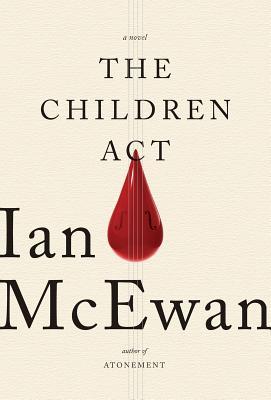Everyone knew the urge to run from the world; few dared do it.It was interesting for me to read The Children Act so soon after On Chesil Beach because author Ian McEwan might have been writing about the same two characters, set thirty-five years apart. While the earlier work dealt with newlyweds, the current novel is about a couple, approaching sixty, who have their safe and settled marriage rocked from within: Fiona, a High Court judge dealing in Family Law cases, has been informed by her husband Jack, a professor, that he has an opportunity to have a passionate affair with a much younger woman, and as he thought he deserved this one last shot at rapture, Jack assumed he wife would appreciate him being upfront about it; that she would be a good sport and give her blessing. Fiona was not a good sport. (And anyone who has read both books will see the obvious parallels.)
Just as her home life is in maximum turmoil, Fiona is given an emergency case file: Adam, a Jehovah's Witness just three months short of his eighteenth birthday – and therefore, three months short of making his own medical decisions – has leukemia, and without an immediate blood transfusion, would soon die. The quick trial that follows – Fiona keeps all legal arguments brief because of the timeliness of the emergency – reasonably represents all of the legal/religious/moral viewpoints that are at play, and when Fiona decides to visit the boy in hospital, she finds him to be charming, intelligent and a precocious and artistic soul. Although her eventual judgement has far reaching consequences, and despite the fact that the case seemed to affect her emotionally at the time, Fiona is able to close the file and move on once it's over.
This coolness seems to be the key to Fiona: Always ambitious, she had put off motherhood until it was too late as she pursued her career; a fact that seemed to be ultimately acceptable to both her and Jack. On the bench, Fiona took pride in her “correct and elegant” judgements, hoping to be quoted and cited in future trials. Even more pointedly: Fiona is an accomplished classical pianist, but no matter how Jack encouraged her, she couldn't bring life to the jazz pieces that he asked her to learn; whether in music or jurisprudence or her marriage, Fiona is uncomfortable improvising beyond what is written, and the few times she acts impulsively, the results are painful. More than anything – more than the hurt of her husband wanting to have his fling – Fiona is dedicated to keeping up appearances.
She went slowly along Theobald’s Road, still holding off the moment of her return, wondering again whether it was not love she had lost so much as a modern form of respectability, where it was not contempt and ostracism she feared, as in the novels of Flaubert and Tolstoy, but pity. To be the object of general pity was also a form of social death. The nineteenth century was closer than most women thought.There is much irony in a judge who rules in divorce cases having to deal with a challenged marriage; Fiona finds herself behaving just as badly as the wives she needs to caution from the bench. But more than anything – as with the central case involving the Jehovah's Witnesses – The Children Act might be an examination of the need for the cool rationality of the law to overrule the superstitious beliefs of religion: Fiona recalls cases where she needed to prevent a Muslim father from taking his daughter to Morocco, where she needed to intervene in the education of children from an Orthodox Jewish sect, and where she had to decide the fate of conjoined twins whose Catholic parents opposed separation if it was a death sentence for one of the children. As with the several comments about climate change in this book, atheist McEwan doesn't miss many opportunities to insert his beliefs. In this regard, Fiona and her literal interpretation of the law is his perfect mouthpiece.
I enjoyed the legal bits in this story and there were some nice moments within Fiona and Jack's marriage, but it didn't blow me away; there's very little that I want to quote or remember. The Children Act was made more interesting to me because of its parallels with On Chesil Beach, but it didn't make me itch to read more McEwan.

